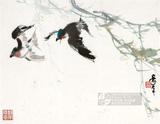宋人法書(四) 冊 洪咨夔致舟公堂頭禪師尺牘
推薦分享
資源連結
連結到原始資料 (您即將開啟新視窗離開本站)後設資料
- 資料識別:
- 故書000246N000000004
- 資料類型:
- 類型:書法
- 型式:文字
- 著作者:
- 洪咨夔
- 出版者:
- 數位化執行單位:國立故宮博物院
- 格式:
- 本幅 29.4x58.6 公分、全幅 42.5x76.8公分
- 語言:
- 漢文
- 關聯:
- 石渠寶笈續編(乾清宮),第一冊,頁445-473 &*故宮書畫錄(卷三),第一冊,頁178-214&*故宮歷代法書全集,第十三冊,頁64-81、181-190&*洪咨夔(1176-1236),字舜俞,號平齋,浙江人。為南宋詩人,詩詞氣魄恢宏,頗得辛稼軒豪邁雄健之風。 由於洪咨夔曾贈詩給湖州道場山護聖萬壽禪院住持法舟禪師,禪師感念此事,欲將洪詩與蘇軾〈游道場山何山〉詩刻石山中。端平二年(1235),洪氏書此札回應此事。時洪氏病重,故云「猿鶴入夢」,而隔年病逝。又札中反應宋代官方對寺院僧侶之管理。接著「安知老菜根,通天下只一般滋味」,顯示看淡功名利祿的豁達。(20101015)&* Hong Zikui (style name Shunyu, sobriquet Pingzhai) was a native of Zhejiang. A Southern Song poet, his verse was bold and magnificent, much in the robust and heroic style of Xin Jiaxuan. Hong Zikui once presented poetry to the abbot of the Daochangshan Husheng Wanshou Monastery in Huzhou, Chan Master Fazhou, who expressed gratitude by having it and Su Shi’s verse on “Trip to Daochangshan and Heshan” engraved on a mountain cliff. In this letter of 1235 Hong wrote in response to this event. At that time he was very ill, which is why he wrote, “Gibbons and cranes have entered my dreams,” passing away the following year due to illness. The letter also reflects the government management of temples and the clergy in the Song dynasty. In it is a quote that reveals Hong’s open-minded and indifferent attitude towards pursuing the fame and fortune of officialdom.(20101015)&*1.侯怡利,〈致舟公堂頭禪師尺牘〉,收入何傳馨主編,《文藝紹興:南宋藝術與文化•書畫卷》(臺北:國立故宮博物院,2010年十月初版一刷),頁393。
- 管理權:
- 國立故宮博物院
授權聯絡窗口
- 國立故宮博物院圖像授權、出版授權、影音資料授權-申請流程說明
http://www.npm.gov.tw/zh-TW/Article.aspx?sNo=03003061






